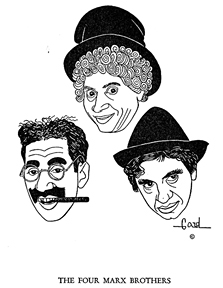Here are 10 things you should know about Maureen O’Hara, born 100 years ago today. She was a strong, talented and beautiful daughter of Ireland.
Tag: Harry Richman
Moonlight Saving Time for Us, Please!
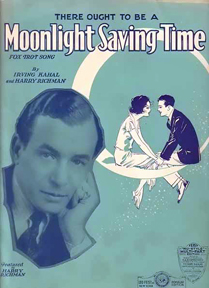 We’re awfully fond of the Harry Richman–Irving Kahal tune, (There Oughta Be a) Moonlight Saving Time, and we invariably think of it on this day every spring.
We’re awfully fond of the Harry Richman–Irving Kahal tune, (There Oughta Be a) Moonlight Saving Time, and we invariably think of it on this day every spring.
It was recorded by a wide variety of artists and orchestras when it debuted back in 1931, from Ambrose and His Mayfair Hotel Orchestra to Maurice Chevalier, Guy Lombardo and His Royal Canadians, and Jay Wilbur’s Hottentots, but our favorite rendition, in large part because she sings the verses as well as the chorus (unlike most of the other artists who have recorded, back then and in the years since) is by Cladrite Radio sweetheart Annette Hanshaw, who recorded the song in New York City on May 9, 1931, accompanied by Jimmy Dorsey on clarinet, Sammy Prager on piano and Eddie Lang on guitar.
Our gal Annette’s performance of the song manages to be simultaneously playful, sincere and just a little bit saucy, which shouldn’t be surprising. She was a terrific singer, and it’s a catchy and clever song. Enjoy!
(There Oughta Be a) Moonlight Savings Time
Birdies fly with new ambition,
Spring is in their song.
Soon you’ll find yourself a-wishin’
Days were not so long.
If my thought is not defined,
Listen while I speak my mind:There oughta be a moonlight saving time
So I could love that boy o’ mine
Until the birdies wake and chime ‘Good morning!’There oughta be a law in clover time
To keep that moon out overtime,
To keep each lover’s lane in rhyme till dawning.You’d better hurry up, hurry up
Hurry up, get busy today.
You’d better croon a tune, croon a tune
To the man up in the moon,
And here’s what I’d say:There oughta be a moonlight saving time
So I could love that boy of mine
Until the birdies wake and chime ‘Good morning!’In January, the nights are very long
But that’s all right.
In happy June comes the honeymoon time;
Days are longer than the nights.In lovetime season, the moon’s the reason
For every cuddle and kiss.
When days are longer, the nights are shorter.
Something should be done about this.Oh, there oughta be a moonlight saving time
To make the morning glories climb
An hour later on the vine each morning.You sorta need a moon to bill and coo,
An old back porch, a birch canoe.
A parlor lamp in June won’t do, I’m warning.I’ve heard the farmer say, ‘I’ll make hay
While the sun is shining above.’
But when the day is done, night’s begun;
You can ask the farmer’s son, it’s time to make love.There oughta be a moonlight saving time
So I could love that boy of mine
Until the birdies wake and chime ‘Good morning!’
Words by Irving Kahal; music by Harry Richman—1931
In Your Hat, pt. 11
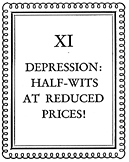
In Your Hat, pt. 9
In Chapter 9 of In Your Hat, the 1933 tell-all memoir by Hat Check Girl to the Stars Renee Carroll, she offers recollections of more celebrities than we could possibly list here. Many of the names are still familiar; others all but forgotten. A few we couldn’t even track down via the internet, and heaven knows we tried.
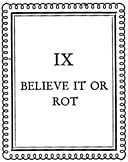
EVEN Fred Keating, the magician, once forgot where he put his hat check!
But hat check girls, even red-haired ones, have memories, so sometimes when business at my window is slack, I sit and think of the million and one things that have happened between the celebrity-laden walls of Sardi’s. Incidents, names, personalities galore, and sometimes just a casual word will start my train of thought along almost forgotten tracks. Would you like to lift the lid of the Carroll cranium and see what’s going on inside?
Here comes George Jean Nathan, world’s best critic by his own admission. I’ll never forget the day I bawled him out because he insisted on having his hat set apart from the others—and how embarrassed he was. I never suspected anyone could embarrass him . . . telling Warner Baxter that he was my favorite movie star, only to be overheard by Richard Dix to whom I had dished out the same line only two days before . . . the day Helen Menken, reddest of the red-heads, gave us a big surprise by changing to the color gentlemen are supposed to prefer . . . Incidentally, she never takes her gloves off when she eats!
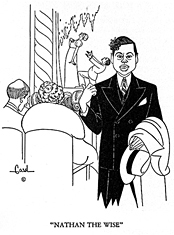 And here is Robert Garland, who pilots (or piles-it) the dramatic column in the World-Telly, and is a regular customer as a certain blind spot in the roaring Fifties (they’re roaring further uptown now). He’d been a regular patient at the drink infirmary for more than a year when one night he showed at the barred door and knocked the magic knock. A weary, unshaved faced appeared in the aperture.
And here is Robert Garland, who pilots (or piles-it) the dramatic column in the World-Telly, and is a regular customer as a certain blind spot in the roaring Fifties (they’re roaring further uptown now). He’d been a regular patient at the drink infirmary for more than a year when one night he showed at the barred door and knocked the magic knock. A weary, unshaved faced appeared in the aperture.
“Pliss?”
“Hello, Tony, I wanna come in.”
“Who are you?” the face inquired.
Infuriated because he had spent his good shekels for so many nights and still remained a dim bulb in the big sign, he shouted back the first thing that came to his mind—a catchline from a New Yorker cartoon.
“You must remember me,” yelled Garland, “I’m the guy who punched my wife in the nose here last night.”
And he was ushered in with any more undue ceremony!
Read More »

